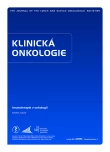-
Medical journals
- Career
Therapeutic Effect and Tolerance of Ipilimumam in Metastatic Malignant Melanoma in Children – a Case Report
Authors: V. Bajčiová
Authors‘ workplace: Klinika dětské onkologie LF MU a FN Brno
Published in: Klin Onkol 2015; 28(Supplementum 4): 115-120
Category: Specials
doi: https://doi.org/10.14735/amko20154S115Overview
Background:
Malignant melanoma is a rare malignancy in the pediatric population. Etiology is usually unknown. Clinical symptoms are nonspecific, clinical behavior and biology features may differ from those in an adult population. The most important prognostic factor is spread of disease. Surgical resection is treatment of choice for localized melanoma. Advanced and metastatic melanoma is still an incurable disease.Case:
We are presenting an eight‑year ‑ old boy with metastatic malignant melanoma of unknown origin based on TP53 mutation (Li ‑ Fraumeni syndrome). He underwent surgery and adjuvant chemotherapy (temozolomide as single agent). Complete remission was achieved at the end of treatment. Two years after the end of therapy (and 31 months from diagnosis) he developed metastatic progression to the lungs. He has received immunotherapy with ipilimumab, according to our knowledge as the first child under the age of 12 in Europe. He completed three courses of ipilimumab, with irAE (immune related adverse event) grade III during the first course of anti CTLA ‑ 4. Therefore, further doses of ipilimumab were given with corticoids and antihistamines as premedication. Also, asymptomatic thyreoiditis grade II has been confirmed. The best documented treatment response is stable disease. Performance status was excellent. Three years since the first progression, he developed further massive progression to the lungs. Second line immunotherapy with anti‑PD ‑ 1 monoclonal antibody (pembrolizumab) is currently going on. So far, the overall survival of the patient is 74 months.Conclusion:
The presented case study supports the administration of immunotherapy in children younger than 12 years. Therapeutic effect has led to significant overall survival with tolerable toxicity. The problem remains significantly limited number of pediatric clinical trials using immunotherapy.Key words:
malignant melanoma – childhood cancer – immunotherapy
The author declares she has no potential conflicts of interest concerning drugs, products, or services used in the study.
The Editorial Board declares that the manuscript met the ICMJE recommendation for biomedical papers.Submitted:
20. 8. 2015Accepted:
23. 10. 2015
Sources
1. Bajčiová V. Maligní melanom u dětí a adolescentů. Onkologie 2013; 7(2): 69 – 73.
2. Réguerre Y, Afrik MF, Fraitag S et al. Melanoma in children: diagnosis and treatment specificities. Bull Cancer 2012; 99(9): 881 – 888. doi: 10.1684/ bdc.2012.1628.
3. Cordoro KM, Gusta D, Frieden IJ et al. Pediatric melanoma: results of a large cohort study and propsal for modified ABCD detection criteria for children. J Am Acad Dermatol 2013; 66(2): 913 – 925. doi: 10.1016/ j.jaad.2012.12.953.
4. Paradela S, Foncesa E, Pit ‑ Fernandéz S et al. Prognostic factors for melanoma in children and adolescents. Cancer 2010; 116(18): 4334 – 4344. doi: 10.1002/ cncr.25222.
5. Livestro DP, Kaine EM, Michaelson JS et al. Melanoma in the young: differences and similarities with adult melanoma. Cancer 2007; 110(3): 614 – 624.
6. Neier M, Pappo A, Navid F. Management of melanomas in children and young adults. J Ped Hematol Oncol 2012; 34 (Suppl 2): S51 – S54. doi: 10.1097/ MPH. 0b013e31824e3852.
7. Munzarová M. Ultrafialové záření, pigmentace a maligní melanom. Klin Onkol 1991; 4(4): 99 – 101.
8. Eckschlager T. Má imunoterapie své místo v současné dětské onkologii? Klin Onkol 2003; 16 (Suppl): 125 – 126.
9. Delyon J, Maio M, Lebbé C. The ipilimumab lesson in melanoma: achieving long‑term survival. Semin Oncol 2015; 42(3): 387 – 401. doi: 10.1053/ j.seminoncol.2015.02.005.
10. Homet Moreno B, Parisi G, Robert L et al. Anti PD ‑ 1 therapy in melanoma. Semin Oncol 2015; 42(3): 466 – 473. doi: 10.1053/ j.seminoncol.2015.02.008.
11. Liu LK, Colegio OR. Molecularly targeted therapies for melanoma. Int J Dermatol 2013; 52(5): 523 – 530. doi: 10.1111/ j.1365 ‑ 4632.2012.05829.x.
Labels
Paediatric clinical oncology Surgery Clinical oncology
Article was published inClinical Oncology

2015 Issue Supplementum 4-
All articles in this issue
- Immunotherapy of Bronchogenic Carcinoma and Its Perspectives
- Immunoscore and Its Predictive Value for Colorectal Cancer
- Immune System in Patients with Head and Neck Carcinoma
- Immunotherapy of Urothelial Carcinoma of the Bladder – from BCG Vaccines to Targeted Therapy
- Side‑ effects of Modern Immunotherapy and How to Solve Them in the Clinics
- Therapeutic Effect and Tolerance of Ipilimumam in Metastatic Malignant Melanoma in Children – a Case Report
- History of Immunotherapy – from Coley Toxins to Checkpointsof the Immune Reaction
- Anti‑tumour Weapons of the Immune System
- The Role of Regulatory T-cells in Antitumor Immune Response
- Escape Strategies of Tumors from Immune Surveillence
- Role of Immunotherapy in Pediatric Oncology
- Chimeric Antigen Receptor T-cells – Gene Therapy of the Future for Malignant Diseases?
- The Concept of Immunogenic Cell Death in Antitumor Immunity
- Importance of the Immune System and Immunotherapeutic Options in Malignant Melanoma
- Immunotherapy for Renal Cell Carcinoma
- Role of the Immune System and Possibilities of Immunotherapy in Prostate Cancer
- Present Experience and Perspectives of Immunotherapy of Lung Cancer
- Clinical Oncology
- Journal archive
- Current issue
- Online only
- About the journal
Most read in this issue- Side‑ effects of Modern Immunotherapy and How to Solve Them in the Clinics
- Immunotherapy of Urothelial Carcinoma of the Bladder – from BCG Vaccines to Targeted Therapy
- Escape Strategies of Tumors from Immune Surveillence
- The Concept of Immunogenic Cell Death in Antitumor Immunity
Login#ADS_BOTTOM_SCRIPTS#Forgotten passwordEnter the email address that you registered with. We will send you instructions on how to set a new password.
- Career

